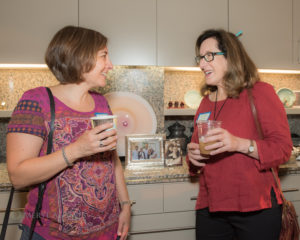By Special Contributor Chelsea Garbell
“Absence is a reason to theorize about something, about what could be. When you don’t know you’re looking for something, you can often find it in front of you.”
On Tuesday, August 14, almost thirty women and men gathered in the beautiful home of Devora and Ron Weinstein to hear from Pamela Lavitt, Director of Arts + Ideas at the Stroum Jewish Community Center and of the Seattle Jewish Film Festival. Pamela, the 2018 recipient of the Pamela Waechter z”l Jewish Communal Professional Award, graced the group with a recounting of her remarkable and unusual career path, and the ways in which women’s stories – herstory and herstories– often zig and zag, crisscrossing to create a rich and textured whole.
The evening began with a d’var from Hadassah Regional Co-President Donna Gordon Blankinship, in which she highlighted the powerful history of Hadassah Hospital and the contemporary work bringing new technological approaches in healthcare to the region.
Seattle Chapter President Susan Adler moderated the discussion, welcoming Pamela and inviting her to share her story with the room. Pamela, who is usually more comfortable curating and exhibiting the lives of others than speaking about her own experiences, surprised the gathering with the revelation that she had initially sought a career in biomedical engineering. Born in Yonkers, New York, Pamela grew up as a “bagel and lox Jew.” She later attended Duke University where she ultimately majored in both zoology and political science. However, with a sense that her true home was in the arts, Pamela delayed medical school to study acting, first at SUNY Purchase and then at the American Conservatory Theatre in San Francisco and HB Studio in New York City. This was followed by time at Tikkun Magazine, where Pamela finally found an outlet for the Jewish intellectual life she craved, and she began to explore her own religiosity.
To “suture all parts of herself together,” Pamela then turned to graduate school, earning her MA and completing her Ph.D. coursework in Performance Studies from New York University, where she studied the history of Jewish women in theatre and pursued an interest in Yiddish language. It was on a trip to the Yiddish Book Center in Amherst, Massachusetts, that she learned that she had an uncle who was a proletariat Yiddish poet. “It took thirty years to learn how Jewish I was, and how important Judaism was to me.” Her history and destiny had been with her all along, waiting for her to reveal them.
Turning to the room, Pamela asked, “How is it that you arrive at yourself?” Pamela’s story, like most herstories, was often long and elongated, but joyously so. Pamela’s own zigzagging journey led her to an interest in the stories of other Jewish women, and to a project with the Jewish Women’s Archive, where between 2001 and 2003 she interviewed 30 women between the ages of 75 and 100, an act of “curating her community.” Oral histories are one of the best ways of collecting herstories; while it reveals a fallible history, it also reveals one of deep textures and emotions. In order to coax her subjects to speak about themselves, she had to develop a whole new set of questions, such as “tell me more” and “what did that mean for you?” Recounting stories of powerhouse Jewish women who had witnessed and contributed to the growth of Seattle and the Seattle Jewish community, Pamela was able to “look through small [lenses] to reveal entire worlds.”
After a question and answer session, Pamela ended the evening with a charge to all of the guests: to curate their own communities, to interview the people in their lives. In doing so, they might just locate something they’d been searching for, what was there all along.
As the evening ended, and women circled one another for more stories and snacks, Jacquie Bayley, advisor and past president of Seattle Hadassah, remarked that you know you’ve thrown a good Jewish event when no one ever seems to leave.
As promised in her remarks, Pamela has shared a collection resources for those interested in cultivating herstories. She has also asked us to remind our membership about some of the exciting upcoming programming at the SJCC.
Herstory Resources
Pamela Lavitt Oral History Handout
Jewish Women’s Archive info:
www.jwa.org
“Weaving Women’s Word – Seattle Stories”
Oral history project and exhibit
Our oral history statement
Listen to these oral histories online
SJCC Upcoming Events and Activities
3SJCC.org Arts+Ideas season announced: www.sjcc.org/arts-ideas (click on genre, music/comedy/talks/
Yotam Ottolenghi Oct. 31 is almost sold out
Female comedians:
Jan. 24 Ophira Eisenberg, comedian/storyteller/host of NPR’s “Ask Me Another” and frequent contributor/host “The Moth”
June 15 Monica Piper’s “Farmisht, Farklempt, and Farblungit”: comedian/storyteller/comedy writer Rugrats, Mad About You, Roseanne
Author Jamie Bernstein, Leonard Bernstein’s daughter on her new memoir and a documentary film about him on the occasion of his centennial. This is part of Seattle Jewish Film Festival.
Theater:
May 18 Rain Pryor’s Solo Play “Fried Chicken & Latkes” about growing up black, Jewish, and Richard Pryor’s daughter.
 Seattle Hadassah
Seattle Hadassah





